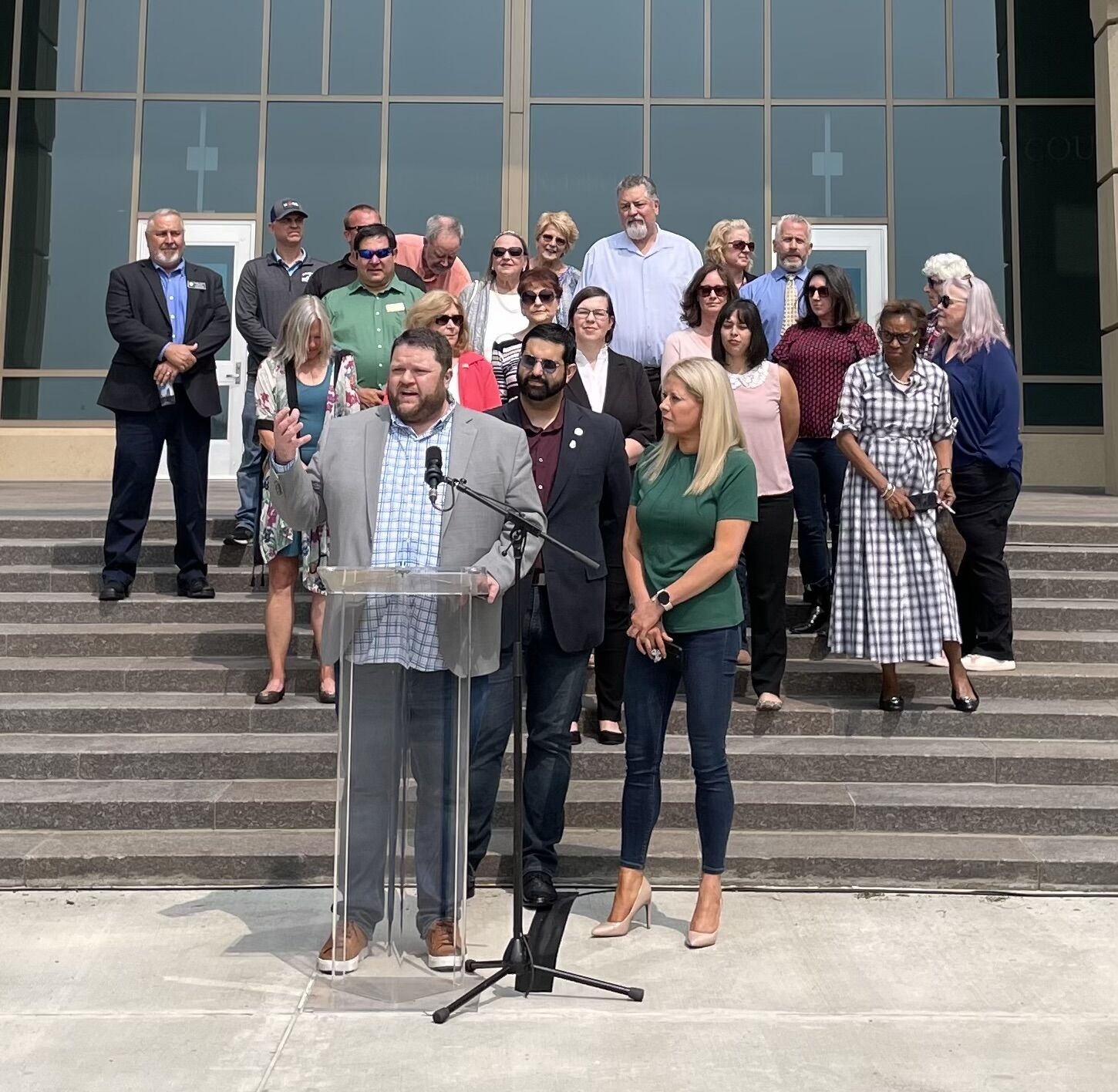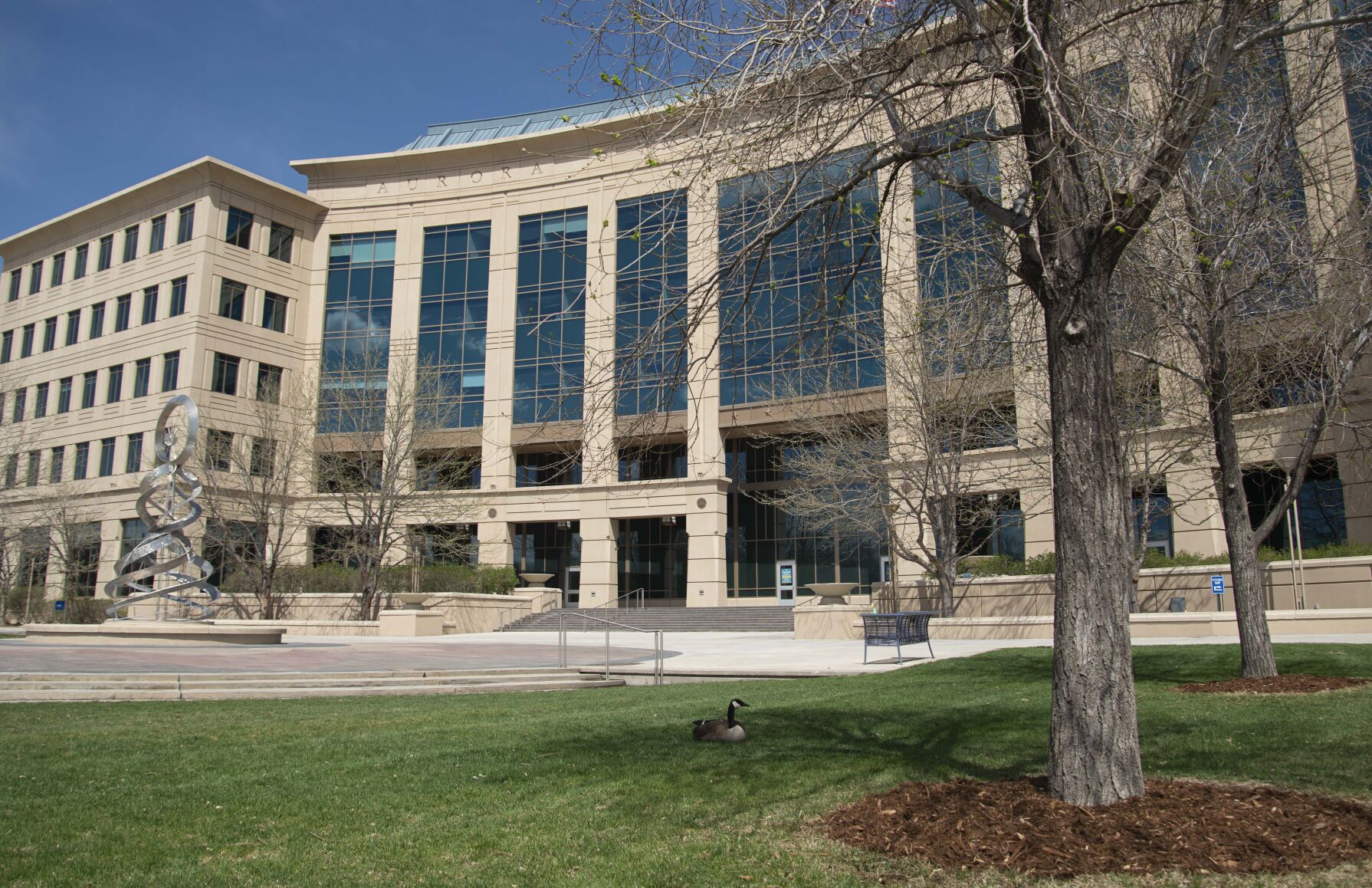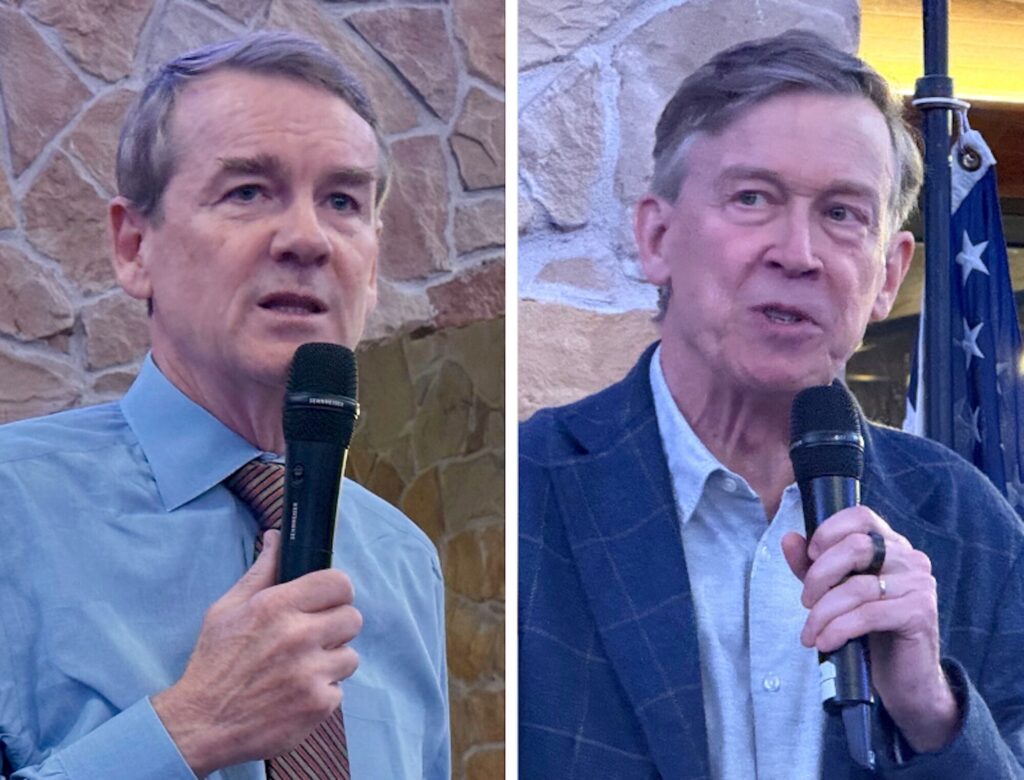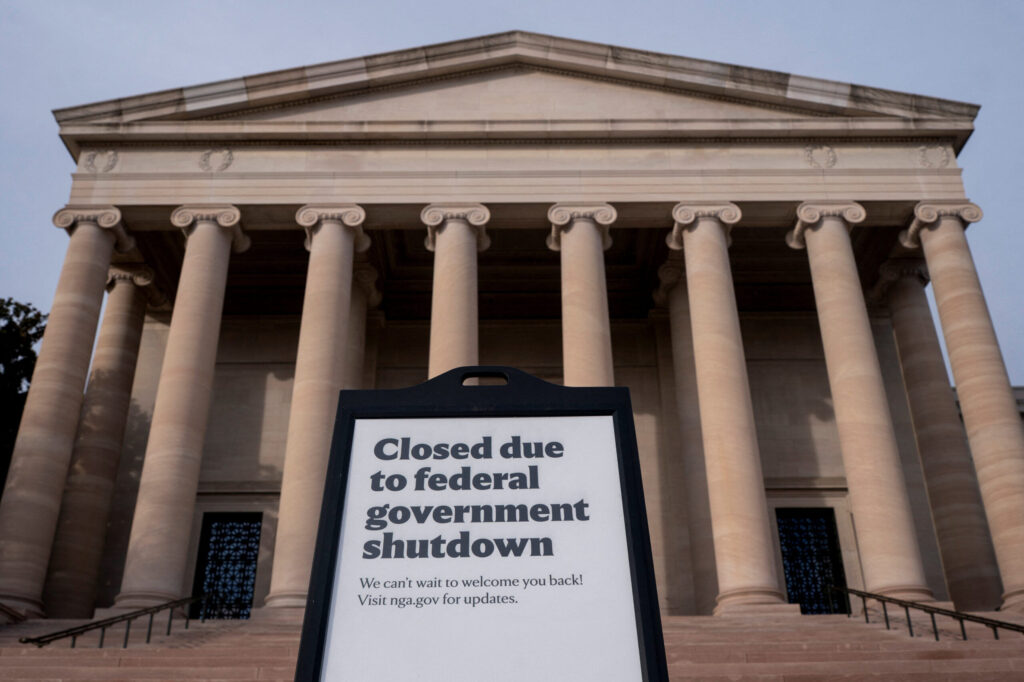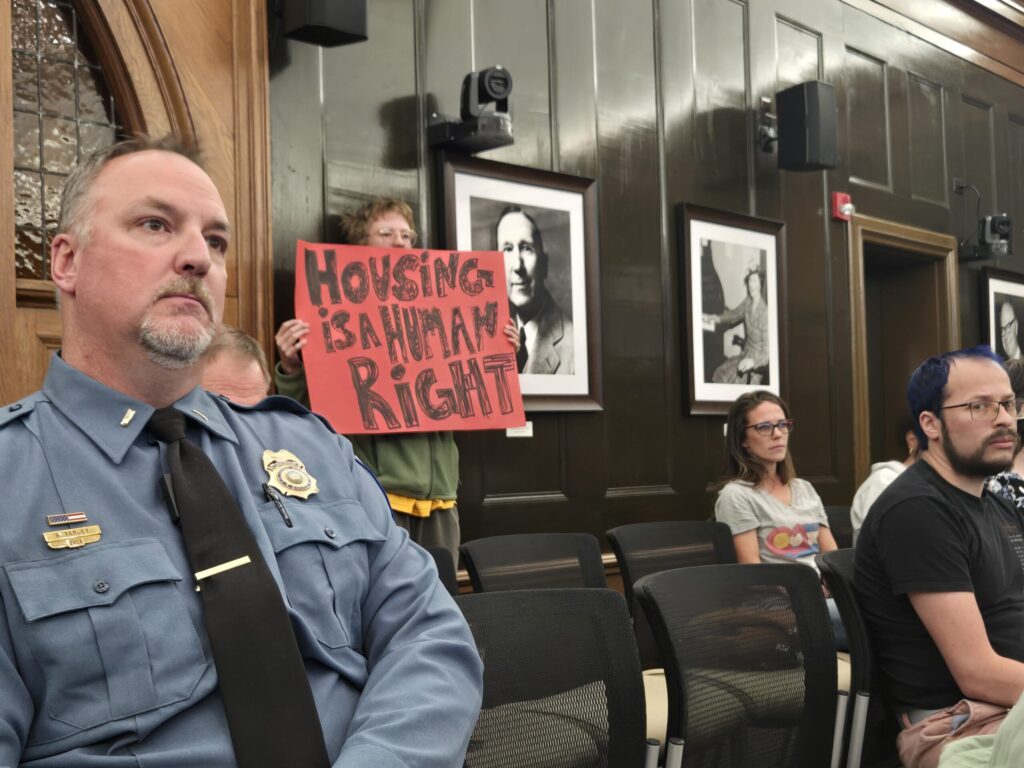Some Aurora leaders denounce ‘strong mayor’ initiative
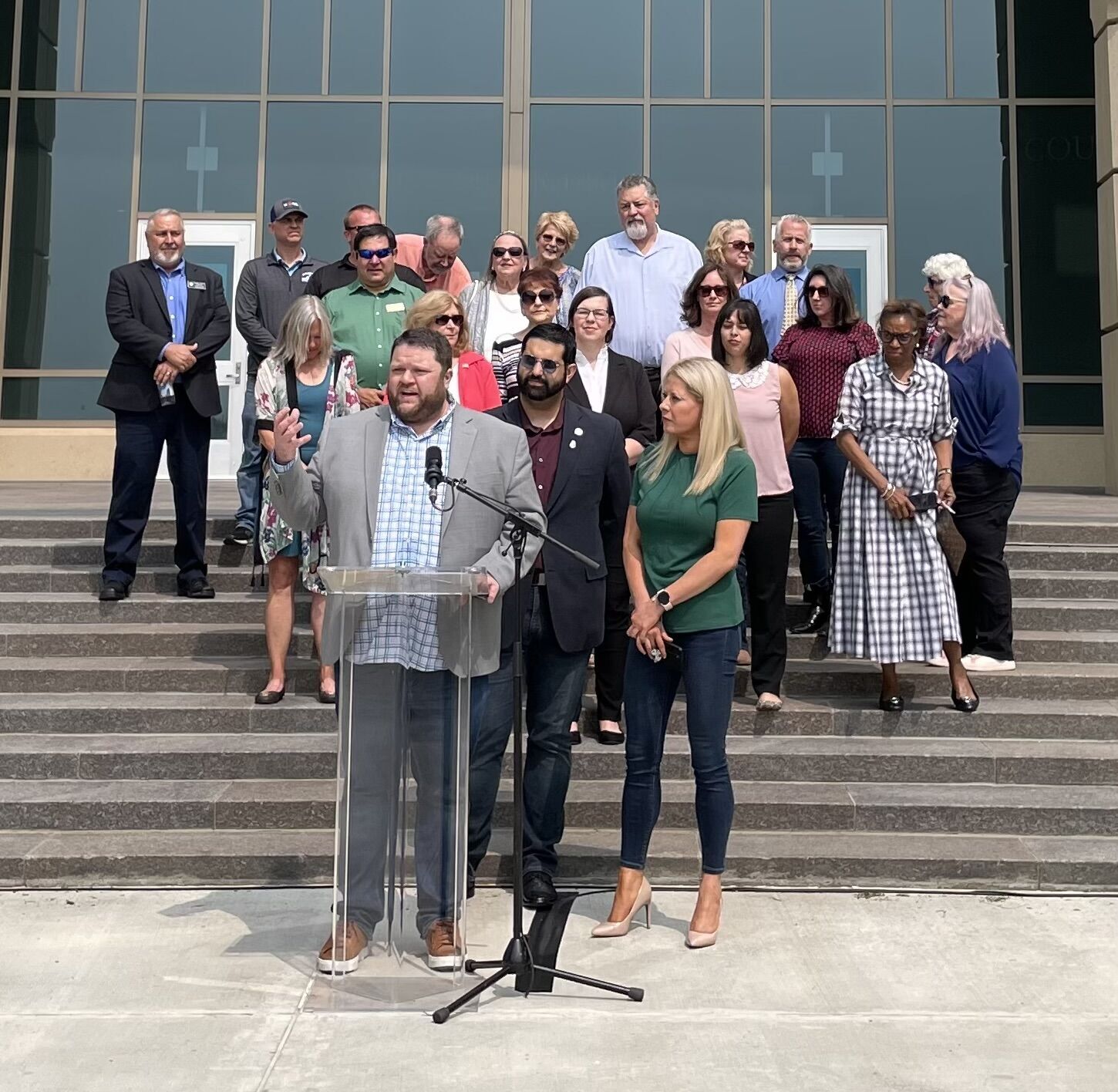
A group of nearly two dozen current and former elected officials, along with police and fire union representatives, gathered on the steps of Aurora City Hall Monday to denounce an effort to create a “strong mayor” form of government in the city.
They claimed that residents are being misled about the proposal, which they argue would concentrate too much power in one person.
At least eight current councilmembers, roughly a dozen former councilmembers, police and fire union representatives, state legislators and county commissioners attended the 3 p.m. news conference, which Councilmember Danielle Jurinsky called “a heavy hitting lineup” of bipartisan leaders standing together against the “strong mayor” proposal.
“Listen, you get Juan Marcano and I standing next to each other for anything, it sends a very clear message,” Jurinsky said to laughs from the group.
Jurinsky, Marcano and Councilmember Curtis Gardner urged residents not to support the “strong mayor” petition, and, if the initiative makes the ballot, to vote “no.”
Petitions are circulating to place a question on the November ballot to ask voters to approve changes to the city charter that would usher in a “strong mayor” system, reduce term limits, and add an at-large council seat.
Proponents must gather more than 12,000 signatures by June 6 to make the November ballot.
Proponents argue that it’s the antidote to city bureaucracy that is disconnected to Aurora’s constituents, and that a “strong mayor” system is more accountable to the people, who, through their vote, can remove the chief executive.
A “strong mayor” system can be found in Pueblo, Colorado Springs and Denver.
At the news conference, current and former councilmembers said they have heard from constituents who said signature gatherers presented the initiative to them as an effort to shorten term limits.
“This is extremely deceptive for the people of Aurora, and whoever is behind this, shame on you,” Jurinsky said.
While the ballot initiative proposes reducing term limits from three consecutive four-year terms down to two, the bulk of the proposal revolves around changing Aurora’s form of government from a council-manager system to a “strong mayor” form of government. It would eliminate the city manager position, give the mayor executive powers, and add an at-large council seat in place of moving the mayor’s seat off the city council.
The group behind the proposal – Term Limits for a Better Aurora – said the initiative seeks to “reform” Aurora’s city government by increasing term limits and “empowering citizens to hold city leadership accountable.”
The group said it would bring “real accountability to city government.”
“Aurora voters pick mayors and city council members, but too much power resides with a mostly unknown, unelected city manager who can appoint police and other department heads with no accountability to the voters,” the group said. “It is time to give the power back to the voters and deliver real accountability to the people of Aurora – through term limits and letting voters hold city leaders accountable at the ballot box.”
Four councilmembers did not attend the news conference this morning. Two of them – Angela Lawson and Francoise Bergan – oppose a strong mayor, while the positions of Dustin Zvonek and Steve Sundberg are not immediately known.
Already, battle lines are forming, and both sides have begun to cast what will likely be dueling narratives, assuming the petition gets enough signature to make it to the ballot.
To critics like Gardner, the pro camp is being disingenuous by emphasizing term limits, presumably because that concept is generally popular. Critics have also begun to cast the proposal as being pushed by unknown entities whose funding sources are obscured.
Supporters, meanwhile, hinted they’ll cast opponents as powers that seek to maintain the status quo, which has not been as responsive or as directly accountable to city residents as a “strong mayor system.” They also argue that checks and balances in a “strong mayor” system are more efficient – because mayors routinely face elections or even a recall.
Aurora has operated with a council-manager form of government for several decades, in which a professional city manager is responsible for running the city administratively and enacting local policy passed by councilmembers.
In a council-mayor form of government, or a “strong mayor” system, the city manager position is eliminated and the mayor become the executive in charge of running the city. “Strong mayors” typically prepare the budget, have veto powers and appoint key department heads, among other duties.
The proposal would give the mayor the powers to veto ordinances, appoint city leaders, hire and fire city staff and department heads, as well as control over city contracts, a news release from the group opposing the initiative said. A supermajority of the council could override the mayor’s veto.
If the mayor’s seat became vacant, the mayor’s chief of staff would be allowed to step in until the council appointed someone to fill the vacancy, but they are not required to be a city resident.
The proposal would also give the mayor control of the police department in times of emergency, eliminate the city council’s contingency fund and the body’s ability to adopt emergency ordinances, and give the mayor a vote in filling council vacancies.
City administration should be left to professional staff, not a single elected official, Gardner told The Denver Gazette, citing numerous awards the city has received for being fiscally responsible while professional staff are in charge.
Aurora has a AAA financial rating and has received the Distinguished Budget Presentation Award for more than two decades by the Government Finance Officers Association, according to the group’s news release.
Aurora Mayor Mike Coffman is currently able to break ties on the city council but is largely a ceremonial figurehead for Aurora. Adopting local policy requires at least six votes from the council, but under the “strong mayor” proposal, “consolidates a vast amount of power behind one person,” Gardner told The Denver Gazette.
Marcano, who is running for mayor, echoed the sentiment, calling the proposal “a naked power grab” and a recipe for disaster. “Strong mayor” systems foster cronyism and nepotism, he said, and vest far too much power in one person.
He has also raised concerns about turnover under a “strong mayor” system and the potential loss of institutional knowledge among longtime city staff if a new mayor changes personnel every few years.
On Monday, Marcano spoke about the history behind the nation’s shift toward council-manager systems, claiming the risk of corruption is higher within “strong mayor” systems. The proposal “would be a step back about a century,” he said.
Travis Pulliam, president of the Aurora Firefighters Local 1290 union, said the organization works hard to preserve the civil service commission’s independence in hiring, firing and disciplining personnel and a “strong mayor” system “threatens that system that we have in place.”
“Also, with the power of the purse that a strong mayor would have, if public safety wasn’t a priority to that person, it could decimate our departments, you know, and potentially cut our budgets in a time where the city is growing,” he said.
Under a “strong mayor” system, the mayor drafts the city’s spending plan, but the council must approve it.
One of the citizens leading the effort is Garrett Walls, who told The Denver Gazette the idea was born from conversations he held with Coffman and that the mayor’s counsel was formative in shaping his views on “strong mayor” forms of government. Coffman is supportive of the proposal, Walls said.
Walls said a “strong mayor” system addresses bureaucracy within city hall and and makes the mayor directly accountable to voters, adding a city of Aurora’s size should have a more empowered mayor.
“It’s time,” he said. “Aurora is a big city now.”
